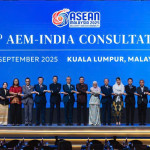Total number of posts 463.

As Malaysia prepares to take on the ASEAN chairmanship in 2025, the country is set to prioritize people-centric measures and enhance trade and investment as well as sustainability. This strategic focus aims to bolster ASEAN’s economic stability and supply chain resilience, fostering a more integrated and dynamic regional economy.
Dr. Jasmine Begum, Microsoft’s ASEAN regional director of legal and government affairs, underscores Malaysia’s pivotal role within ASEAN and on the global stage. She highlights the potential for increased movement of people and small businesses, citing successful examples like Grab Malaysia and Indonesia’s Gojek, which have expanded transnationally within ASEAN and globally. This movement is not just about goods and trade but also about the mobility of people and small enterprises, which can drive economic growth and innovation across the region.
Dr. Oh Ei Sun, a senior fellow at the Singapore Institute of International Affairs, points out that intra-ASEAN trade currently constitutes only a quarter of the total trade between ASEAN countries and the world’s major economic powers. He suggests that doubling this intra-regional trade would be a significant achievement for Malaysia during its chairmanship. This increase would not only enhance economic ties within ASEAN but also reduce the region’s dependency on external markets, thereby strengthening its economic resilience.
Malaysia’s Minister of Investment, Trade and Industry, Zafrul Tengku Abdul, emphasizes the need for tight cooperation among ASEAN members to ensure economic stability. He outlines Malaysia’s plans to position ASEAN as a digital economy hub, which includes strengthening relationships with key trade partners such as the US, China, and India. Additionally, Malaysia sees potential in expanding cooperation with BRICS nations, advocating for continued discussions to reach a common orientation for collaboration with these emerging economies.

Malaysia’s Minister of Investment, Trade and Industry, Zafrul Tengku Abdul
One of the key initiatives highlighted by both Dr. Jasmine and Minister Zafrul is the ASEAN Digital Economy Framework Agreement (DEFA). This agreement aims to boost the region’s digital economy growth to $1 trillion by 2030. Dr. Jasmine suggests that Malaysia could focus on enhancing digital economy transformation, thereby creating accessible economic opportunities for everyone, driving inclusive growth and development.
Minister Zafrul also highlights the importance of promoting e-commerce for small- and medium-sized enterprises (SMEs). By integrating and expanding into new markets, these enterprises can play a crucial role in diversifying ASEAN’s trade. This approach aligns with the broader goal of implementing ASEAN Vision 2045, which aims to sustain growth and establish ASEAN as a leader in technology and digital transformation.
The emphasis on people-centric measures is a recurring theme in Malaysia’s approach to its upcoming chairmanship. Dr. Oh Ei Sun emphasizes that Malaysia should adopt a more people-centric approach, showcasing how ASEAN cooperation and other initiatives can directly benefit the lives of everyday people. This approach is expected to enhance public support for ASEAN initiatives and foster a sense of regional solidarity and cooperation.
At the 24th ASEAN Economic Community Council Meeting (AECC 24) held on October 7, 2024 in Vientiane, Lao PDR, Malaysia announced the four expected strategic thrusts that it would pursue on its Chairmanship year as: (i) Enhancing Trade and Investment, (ii) Creating an Inclusive and Sustainable Pathway, (iii) Promoting Integration and Connectivity of Economies, (iv) Building a Digitally Resilient ASEAN.














